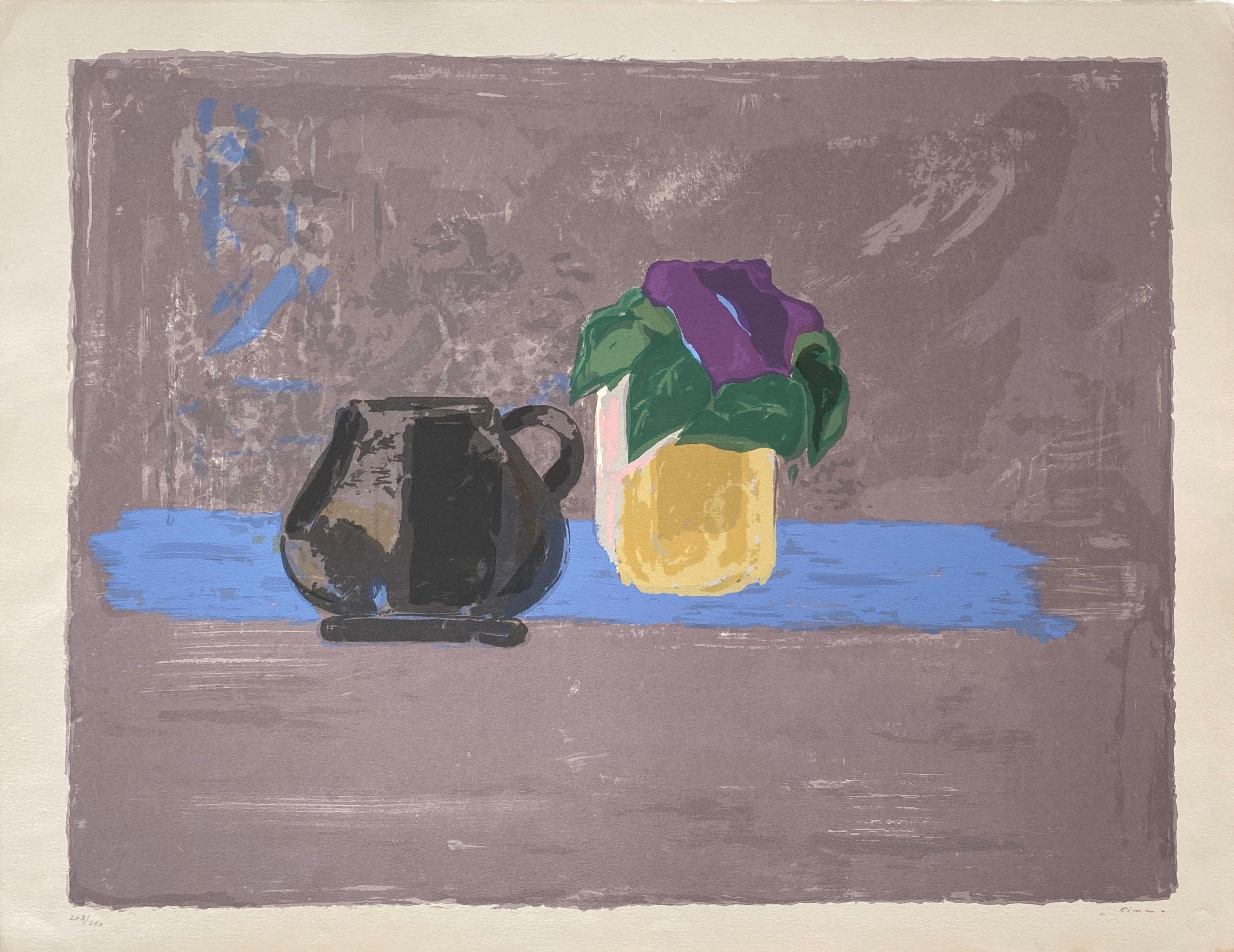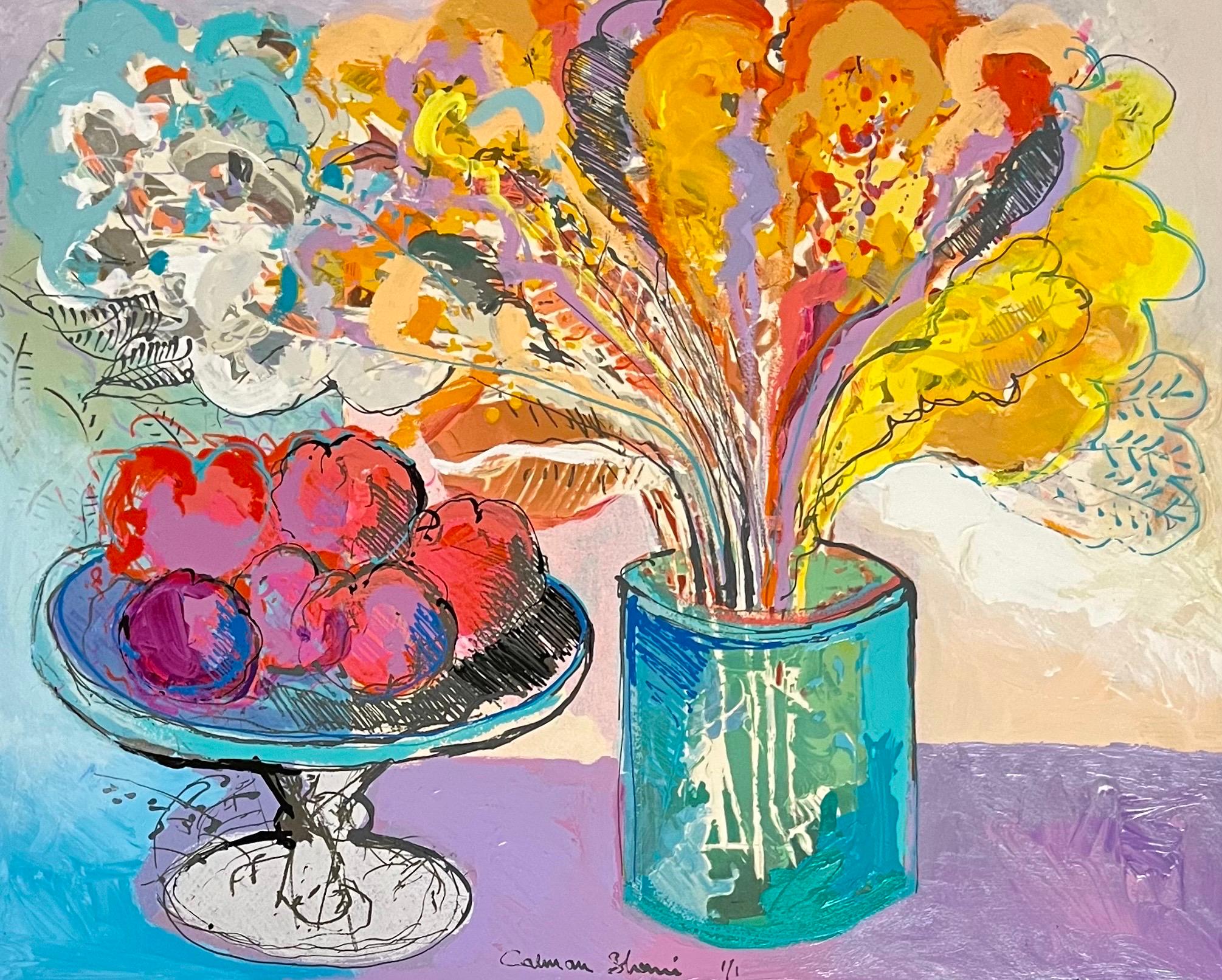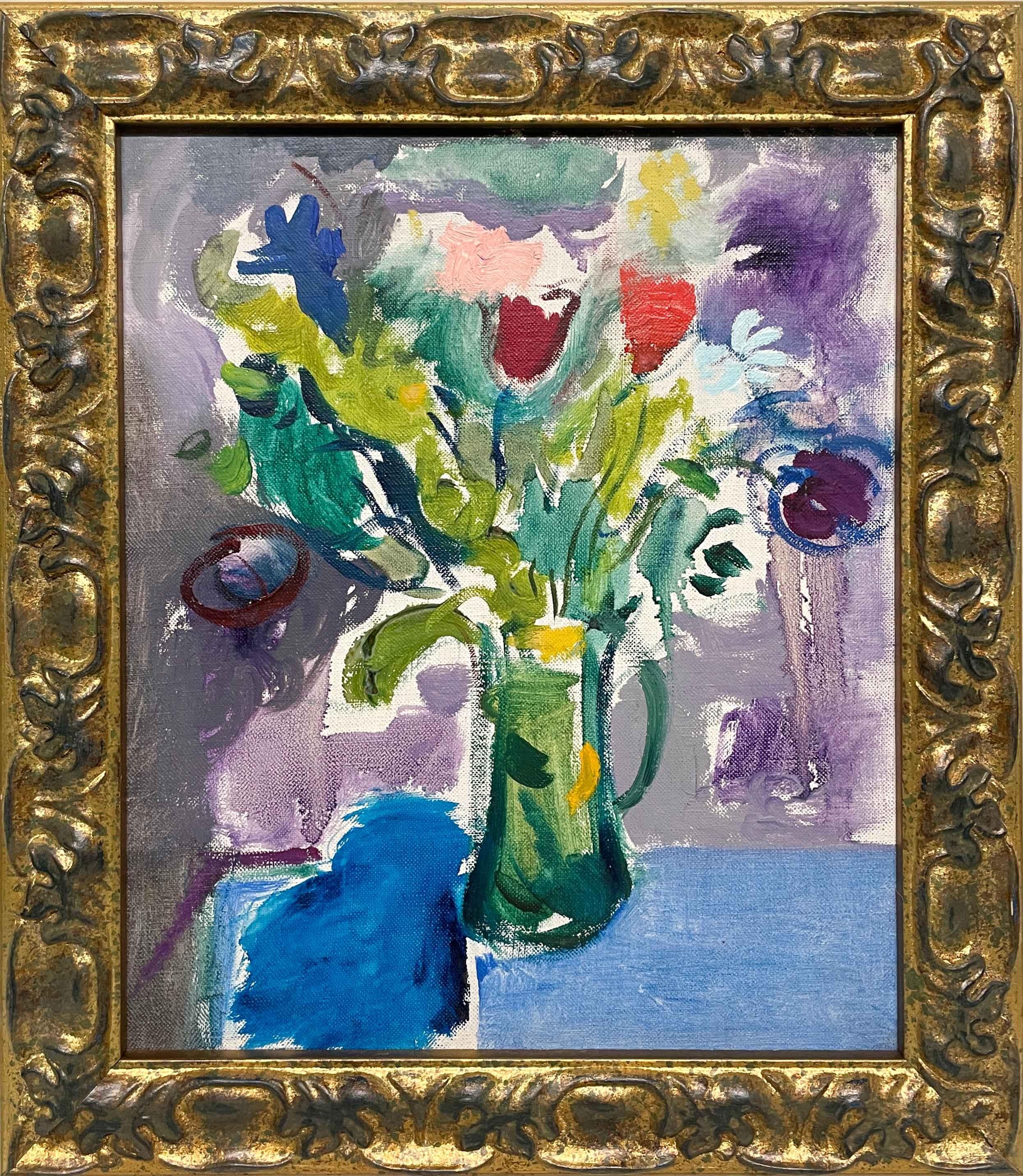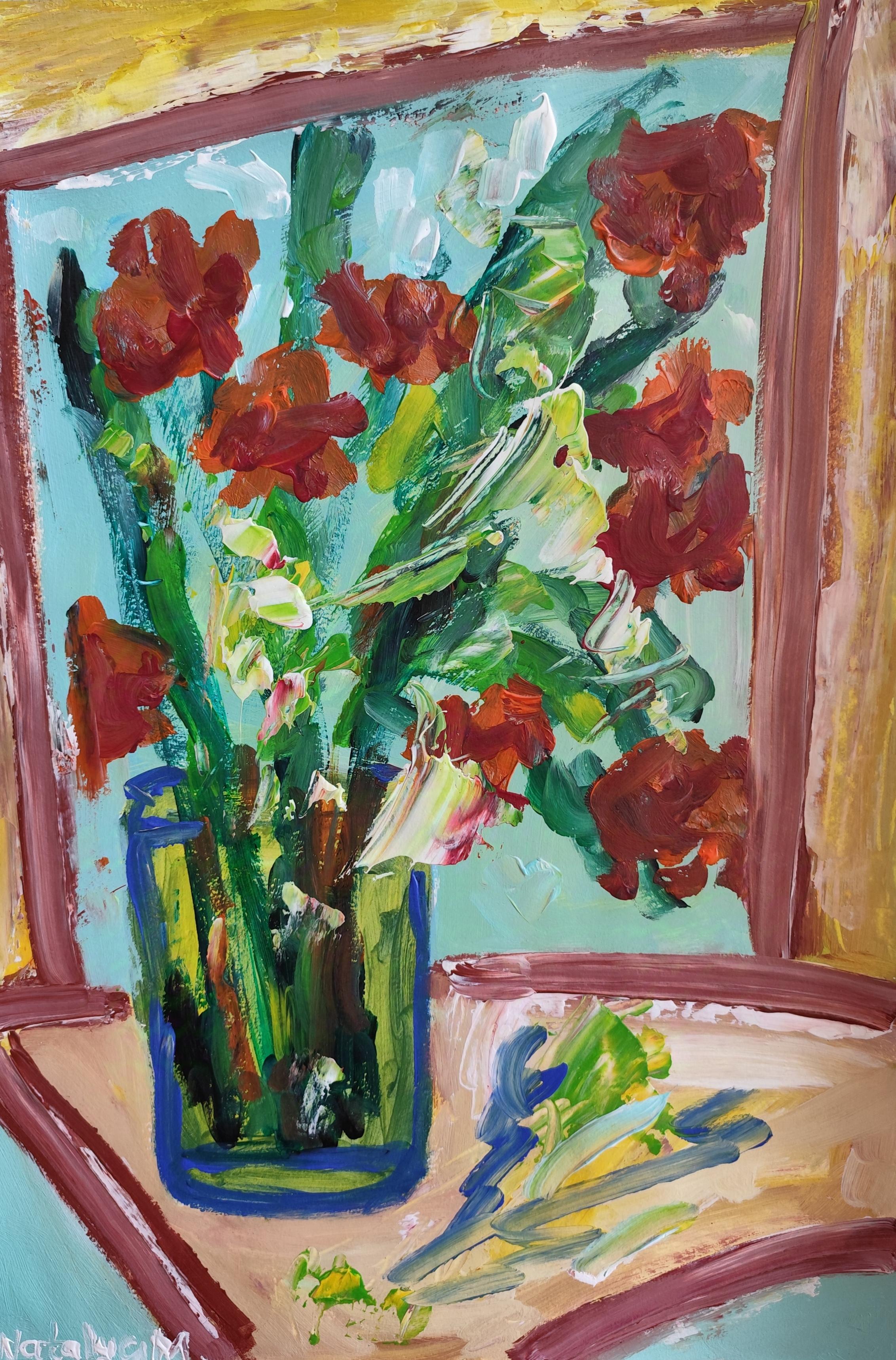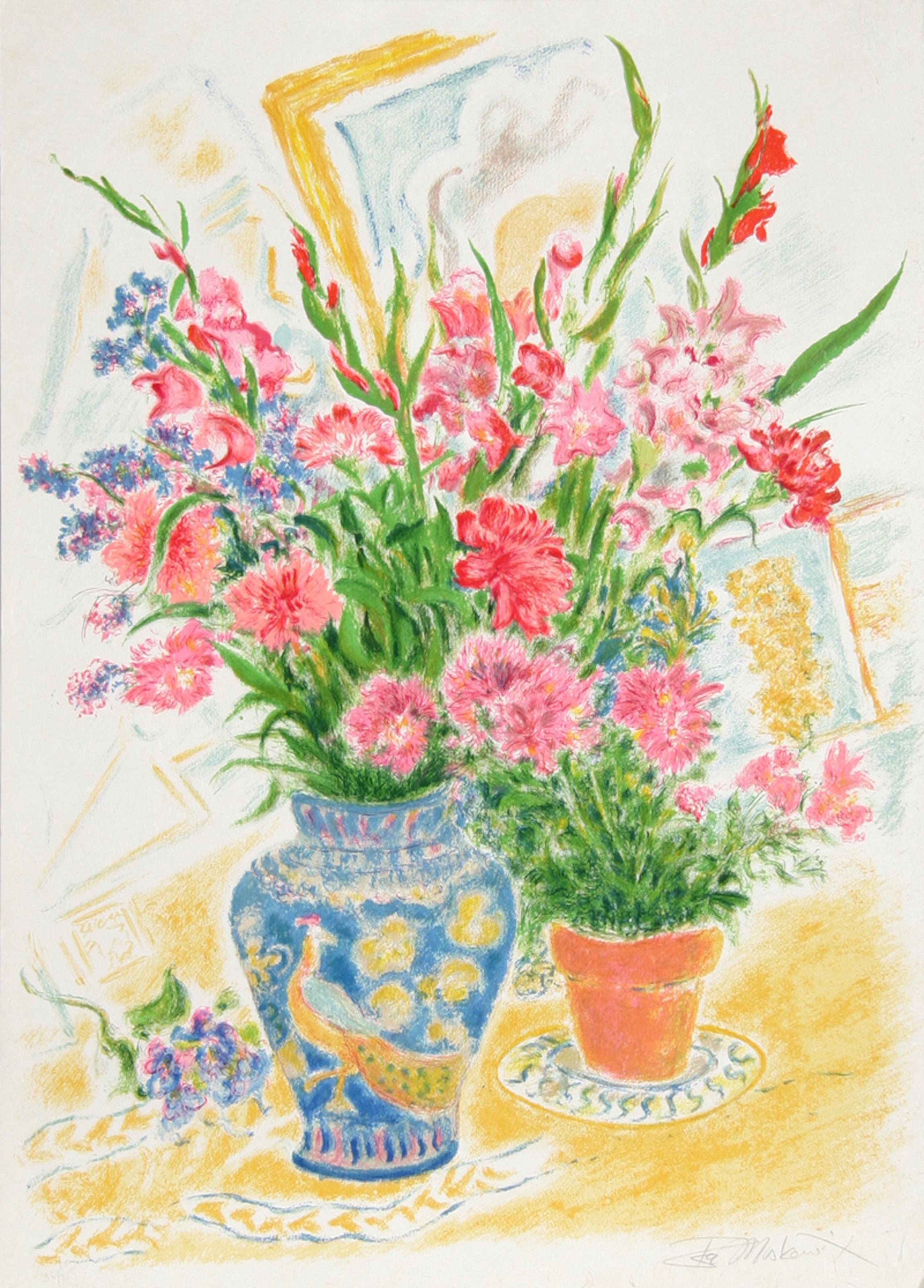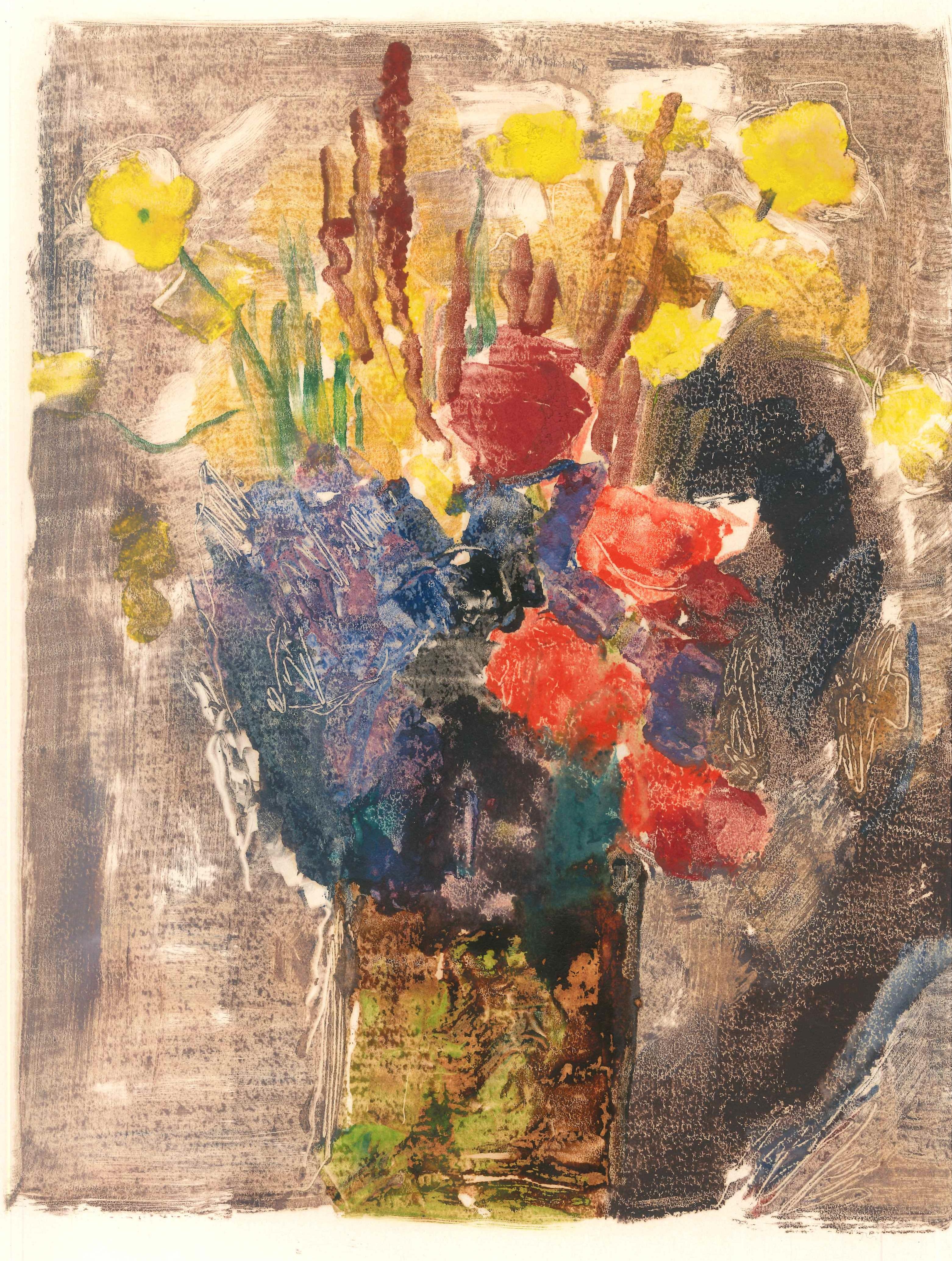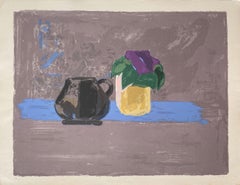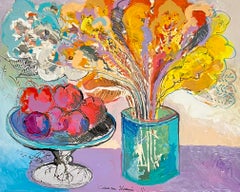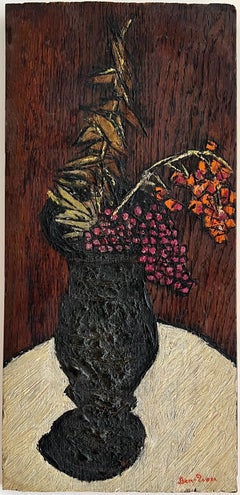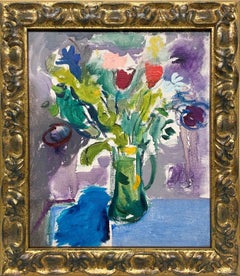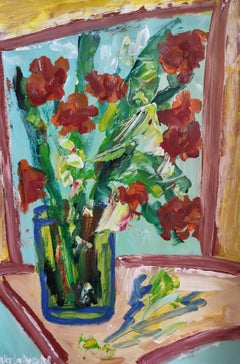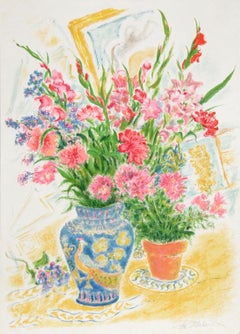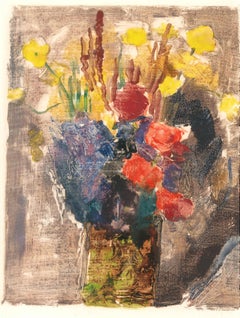Items Similar to Chinese Israeli Modernist Still Life Lithograph Abstract Flowers in Vase
Want more images or videos?
Request additional images or videos from the seller
1 of 14
Efraim FimaChinese Israeli Modernist Still Life Lithograph Abstract Flowers in Vase
$650
£496.48
€567.72
CA$924.01
A$1,013.42
CHF 530
MX$12,244.87
NOK 6,649.94
SEK 6,268.37
DKK 4,237.19
About the Item
Fima (born Efraim Roeytenberg) (1914 – 2005) was an Israeli artist born in China. He spent most of his career in France.
Ephraim (Yafim) Roeytenberg, known as "Fima" or "Pima", was born 22 December 1914 and grew up in Harbin, China. Harbin was a Russian-Chinese city with a large white émigré community. Roytenberg was the son of Russian-Jewish parents. His father was an engineer who worked on the construction of the Chinese Eastern Railway.
Roeytenberg studied in a Russian high school in Harbin, where he learned Chinese as well. After graduating secondary school in 1933, he moved to Shanghai, where he studied architecture while taking painting classes at night. During the 1940s, he worked in Shanghai painting set designs for shows. He attended and later taught at the Russian Academy of Fine Arts in Shanghai. In 1947, he had a solo exhibition at the Jewish Recreation Club in Shanghai. He also displayed his work in group shows.
Roeytenberg immigrated to Israel in February 1949 and settled in Jerusalem. During the 1950s, he made contacts with contemporary Bezalel artists in Israel and explored new ways of painting. In 1954, Roeytenberg traveled to Italy and in 1956 to Paris. In 1960, he had a sold-out exhibition at the Rina gallery in Jerusalem.
In 1961, Roytenberg moved to Paris, where he developed an association with the Jacques Massol gallery. He was there until 2002, exhibiting works in Paris, Israel, and elsewhere. His works were displayed at the Bineth gallery, and he took part in the 1964 Art Israel show at the New York Museum of Modern Art. In 1966, after the death of his wife, Roytenberg spent a year in Finland. There, he met his second wife. Roeytenberg exhibited at the Israel Museum, Jerusalem in 1970, the Jewish Museum in New York in 1972, the Barbican Centre in London in 1990, and had a solo exhibition at the Tel Aviv Museum in 1976.
Select Group exhibitions:
Rina Gallery, Jerusalem
Art Israelien Aujourd'hui, Paris, France
Moshe Castel, Igael Tumarkin, Agam, Mordecai Ardon, Marcel Janco, Yosl Bergner, Yehiel Shemi.
New Acquisitions and Paintings from the Museum Collection. The Bezalel National Museum, Jerusalem. Artists: Lea Nikel, Fima (Roytenberg, Ephraim) Jankel Adler, Yossef Zaritsky, Raffi Lavie.
In 2002, Roeytenberg returned to live in Israel. He travelled to Hong Kong in 2004 when his work was being exhibited there. He continued to paint until a month before his death. He died in Jerusalem on 16 October 2005.
- Creator:Efraim Fima (1916, Israeli)
- Dimensions:Height: 20.2 in (51.31 cm)Width: 28.2 in (71.63 cm)
- Medium:
- Movement & Style:
- Period:
- Condition:Minor Wear. Please see Photos.
- Gallery Location:Surfside, FL
- Reference Number:1stDibs: LU38214830932
About the Seller
4.9
Platinum Seller
Premium sellers with a 4.7+ rating and 24-hour response times
Established in 1995
1stDibs seller since 2014
1,811 sales on 1stDibs
Typical response time: 1 hour
- ShippingRetrieving quote...Shipping from: Surfside, FL
- Return Policy
Authenticity Guarantee
In the unlikely event there’s an issue with an item’s authenticity, contact us within 1 year for a full refund. DetailsMoney-Back Guarantee
If your item is not as described, is damaged in transit, or does not arrive, contact us within 7 days for a full refund. Details24-Hour Cancellation
You have a 24-hour grace period in which to reconsider your purchase, with no questions asked.Vetted Professional Sellers
Our world-class sellers must adhere to strict standards for service and quality, maintaining the integrity of our listings.Price-Match Guarantee
If you find that a seller listed the same item for a lower price elsewhere, we’ll match it.Trusted Global Delivery
Our best-in-class carrier network provides specialized shipping options worldwide, including custom delivery.More From This Seller
View AllChinese Israeli Modernist Still Life Lithograph Abstract Flowers in Vase
By Efraim Fima
Located in Surfside, FL
On Arches French art paper.
Fima (born Efraim Roeytenberg) (1914 – 2005) was an Israeli artist born in China. He spent most of his career in France.
Ephraim (Yafim) Roeytenberg, know...
Category
20th Century Abstract Expressionist Interior Prints
Materials
Lithograph
Unique Modernist Israeli Still Life Monoprint Painting Calman Shemi Vase Flowers
By Calman Shemi
Located in Surfside, FL
Fruit and Flowers monoprint by Calman Shemi
Calman Shemi, sculptor and painter, was born in Argentina in 1939. A graduate of the School of Sculpture and Ceramics in Mendoza, he studied under the Italian-Argentinean sculptor Libero Badii whom he credits with putting him on the right path. “He taught me principals, not only related to sculpture, but human and philosophic principals. Shemi also carefully studied the work of such masters as Pablo Picasso, Caravaggio, Frank Stella and Henri Matisse. “From each one of these great artists I learned something from observing them,” he says.
In 1961, at the age of 20, Shemi immigrated to Israel and joined Kibbutz Carmia of which he was a member for twenty years. There he worked in agriculture and also as a sculptor working with wood and clay. Several of his large-scale fiberglass and polyester sculpture projects are situated in public buildings. He was a student of German-Israeli sculptor Rudi Lehmann, a pioneer of the artistic movement known as “Canaanism.”
Canaanite art was an effort to create a direct relationship with the land, bypassing historic Jewish connotations—hence the land’s primordial name is used. Canaanite works, with an emphasis on the inter-action of simple shapes, bear a deliberate resemblance to the sculpture and ritual art of early civilizations of the Middle East prior to Judaism, always with an eye to the fusion of man and the land itself.
Though sculpture dominated his early years as an artist, in the mid ’70s Shemi developed the idea of the “soft painting” medium. Beginning with a color drawing done to scale, Shemi layers onto the drawing irregularly shaped pieces of variously textured and colored fabrics. Using a threadless 9,000-needle sewing machine, the fabrics are meshed to one another and to the background, resulting in vibrant wool tapestry carpet compositions infused with exuberant color and explosive movement.
Over the years, Shemi has continued to challenge himself with new artistic mediums, developing two more techniques of painting: “Lacquer paintings” and “window paintings.” He also works in monotype, lithograph and silkscreen techniques. He creates his Lacquer Painting by applying vibrant colors to wood or metal panel that has been gilded with gold or silver leaf, and sometimes both. After the oil paint has thoroughly dried, many layers of lacquer are applied to the surface giving it a glowing effect. Between each layer of lacquer the piece is hand-polished to give the surface its very shiny look.
Shemi’s “lacquer” and “window” paintings are reminiscent of ancient techniques used centuries ago in Japan and China.
Shemi concludes, “All of the art that I create is full of optimism and beauty. That’s all. Simple, very simple.”
During the past eighteen years Shemi has held more than seventy one-man shows in the U.S., Japan, Germany, Spain, Belgium and Israel. His works can be seen in many public and private collections around the world. He is of a generation of contemporary Israeli artists, somewhat influenced by pop art that include Alex Pauker...
Category
20th Century Abstract Expressionist Still-life Prints
Materials
Monoprint
American Modernist Oil Painting Expressionist Vase, Flowers WPA Artist Ben ZIon
By Ben-Zion Weinman
Located in Surfside, FL
Ben-Zion (1897-1987)
Flower Piece with Black Vase
Oil on board, Hand signed 'Ben-Zion ' lower right, with the artist 's label and label from Duveen-Graham gallery, NY.
16 x 7 3/4 in., unframed as intended,
Born in 1897, Ben-Zion Weinman celebrated his European Jewish heritage in his visual works as a sculptor, painter, and printmaker. Influenced by Spinoza, Knut Hamsun, and Wladyslaw Reymont, as well as Hebrew literature, Ben-Zion wrote poetry and essays that, like his visual work, attempt to reveal the deep “connection between man and the divine, and between man and earth.”
An emigrant from the Ukraine, he came to the US in 1920. He wrote fairy tales and poems in Hebrew under the name Benzion Weinman, but when he began painting he dropped his last name and hyphenated his first, saying an artist needed only one name.
Ben-Zion was a founding member of “The Ten: An Independent Group” The Ten” a 1930’s avant-garde group, Painted on anything handy. Ben-Zion often used cabinet doors (panels) in his work. Other members of group included Ilya Bolotowsky, Lee Gatch, Adolf Gottlieb, Louis Harris, Yankel Kufeld, Marcus Rothkowitz (later known as Mark Rothko), Louis Schanker, and Joseph Solman. Over the course of the group's existence, seventeen artists exhibited as members of The Ten at nine different shows. The group's nine shows were held at galleries and locations around New York City, including one international exhibition in Paris. David Burliuk, Lee Gatch, John Graham, Earl Kerkam, Karl Knaths, Edgar Levy, Jean Liberté...
Category
Mid-20th Century Expressionist Figurative Paintings
Materials
Oil, Wood Panel
Bold Flowers in a Vase
By Katherine Librowicz
Located in Surfside, FL
Katarzyna LIBROWICZ
Polish French painter studied at the Academy of Fine Arts in Warsaw and arrived in France in 1937 .
She studied with André Lhote in Montparnasse Paris and exhibited at the Salon d'Automne and the Salon des Independants .
She is one of the painters of the School of Paris .
Peintre polonaise.Elle étudia à l'Académie des Beaux-Arts de Varsovie, puis arriva en France en 1937.
Elle suivit les...
Category
20th Century Figurative Drawings and Watercolors
Materials
Watercolor
Abstract Still Life Oil Painting with Ink Theresa Bernstein Flowers in Vase
By Theresa Bernstein
Located in Surfside, FL
Theresa Bernstein, 1890 - 2002
Abstract Still Life Oil and Pen on Paper Painting (1994) by Theresa Bernstein
Frame: 26" X 22", Image: 18.5" X 14.75"
A Polish born American modernist figurative artist in the traditions of the Ashcan and New York Realism Schools, wife of William Meyerowitz. The artwork represents a still life with two flower vases. Signed by the artist and dated 1994 in the lower left.
Theresa Ferber Bernstein-Meyerowitz (1890 – 2002) was an American artist, writer, and supercentenarian born in Kraków, in what is now Poland, and raised in Philadelphia. She received her art training in Philadelphia and New York City. Over the course of nearly a century, she produced hundreds of paintings and other artwork, plus several books and journals.
Bernstein and her husband William Meyerowitz (a WPA, New deal artist), who was also an artist, lived and worked in Manhattan and Gloucester, Massachusetts. She painted portraits and scenes of daily life, plus reflections of the major issues of her time, in a modern style that evolved from realism to expressionism. She was active in several art associations and promoted her husband's work as well as her own. Her artworks are found in dozens of museums and private collections in the United States and abroad. She remained active all her life and was honored with a solo exhibition of 110 art works to celebrate her 110th birthday.
Bernstein also authored several books, including a biography of her husband and a journal about their many trips to Israel.
She died in 2002, just a couple of weeks short of her 112th birthday.
Theresa Ferber Bernstein was born in Cracow, Poland, on March 1, 1890. She was the only child of Isidore Bernstein, a Jewish textile...
Category
1990s Abstract Abstract Paintings
Materials
Paper, Oil, Pen
Israeli Josef Zaritsky Abstract Modernist Lithograph Print "Composition"
Located in Surfside, FL
Abstract Composition, 1959 Lithograph
This was from a portfolio which included works by Yosl Bergner, Menashe Kadishman, Yosef Zaritsky, Aharon Kahana, Moshe Tamir and Michael Gross.
Joseph (Yossef) Zaritsky (Hebrew: יוסף זריצקי; September 1, 1891 – November 30, 1985) was one of Israel's greatest artists and one of the early promoters of modern art in the Land of Israel both during the period of the Yishuv (Palestine, the body of Jewish residents in the Land of Israel before the establishment of the State of Israel) and after the establishment of the State. In 1948 Zaritsky was one of the founders of the "Ofakim Hadashim" group. In his works he created a uniquely Israeli style of abstract art, which he sought to promote by means of the group. For this work he was awarded the Israel Prize for painting in 1959.
Joseph Zaritsky...
Category
1950s Modern Abstract Prints
Materials
Lithograph
You May Also Like
A Lively, 1950s Mid-Century Modern Floral Still Life Painting by Francis Chapin
By Francis Chapin
Located in Chicago, IL
A Lively, Colorful 1950s Mid-Century Modern Floral Still Life Painting by Notable Chicago Artist, Francis Chapin (Am. 1899-1965). Full of color, with wonderful brushwork, the painti...
Category
Mid-20th Century American Modern Still-life Paintings
Materials
Canvas, Oil, Board
Contemporary still life composition of flowers in a vase acrylic on paper
Located in VÉNISSIEUX, FR
This vibrant artwork " Summer flowers bouquet by the window" features a dynamic still life composition of flowers in a vase. Bold brushstrokes bring energy and movement to the canvas...
Category
2010s Contemporary Figurative Paintings
Materials
Paper, Acrylic
Flowers 6, Modern Lithograph by Ira Moskowitz
By Ira Moskowitz
Located in Long Island City, NY
Ira Moskowitz, Polish/American (1912 - 2001) - Flowers 6, Year: circa 1979, Medium: Lithograph, signed and numbered in pencil, Edition: 75, Size: 29.5 in. x 21 in. (74.93 cm x 53.34...
Category
1970s Modern Still-life Prints
Materials
Lithograph
Bouquet - Original Lithograph 20th Century
Located in Roma, IT
Bouquet is an original artwork realized in the XX Century.
Original lithograph on paper.
Perfect conditions.
Beautiful and fresh lithograph representing a colored bouquet of flow...
Category
Mid-20th Century Modern Still-life Prints
Materials
Lithograph
Flowers 7, Modern Lithograph by Ira Moskowitz
By Ira Moskowitz
Located in Long Island City, NY
Ira Moskowitz, Polish/American (1912 - 2001) - Flowers 7, Year: circa 1979, Medium: Lithograph, signed and numbered in pencil, Edition: 250, AP, Size: 30 x 21 in. (76.2 x 53.34 cm...
Category
1970s Modern Still-life Prints
Materials
Lithograph
$480 Sale Price
20% Off
1970's French Modernist Painting Provence Collection Still Life Flowers in Jug
Located in Cirencester, Gloucestershire
Still Life of Flowers
Nude Lady Model
French School, circa 1970's
oil painting on thin card, unframed
size: 24 x 17 inches
condition: overall very good, a very few light markings t...
Category
1970s Impressionist Still-life Paintings
Materials
Oil
More Ways To Browse
Israel Vase
Vintage Jazz Dress
Banksy Happy Choppers
Jane Goldman
Joni Frankel
Peter Max Green Dress
Roy Lichtenstein Oval Office
Shaker Stove
Sleeping Beauty 1959 Lobby Card
Waiting For The Boys
Benjamin Buckley
C Riom
Charles Fazzino 3 D
David Hockney Rue De Seine
Desire Guilmard
Dial M For Modern
Frank Z
Harpers Weekly Framed
